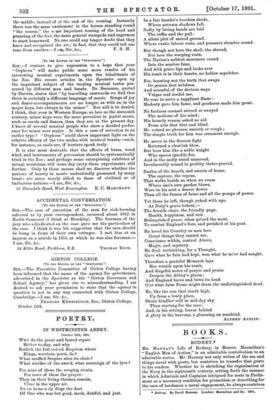[TO THE EDITOR or THE " SPECTATOR:9 venture to give
expression to a hope that your "Orpheus" will make public some more results of his interesting musical experiments upon the inhabitants of the Zoo. His recent articles in the Spectator open up the important subject of the varying musical tastes pos- sessed by different men and beasts. Dr. Seemann, quoted by Darwin, states that " by travelling eastwards we find that there is certainly a different language of music. Songs of joy and dance-accompaniments are no longer, as with us, in the major keys, but always in the minor." Nor will it be denied, I think, that even in Western Europe, as late as the sixteenth century, minor keys were far more prevalent in joyful music, snob as carols and dances, than they are at the present day. I know of several musical people who show a decided prefer- ence for minor over major. Is this a case of reversion to an earlier type " Orpheus " could throw important light on the relative efficacy of the two modes with musical beasts,—such, for instance, as seals are, if hunters speak truly.
It is also most desirable that the effects of brass, wood wind, and instruments of percussion should be systematically tried in the Zoo ; and perhaps some enterprising exhibitor of savage musicians will some day carry these experiments still further. Only by these means shall we discover whether the notions of beauty in music undoubtedly possessed by many beasts are more nearly allied to those of civilised or of barbarous nations.—I am, Sir, &c.,
67 Sterndale Road, West Kensington. E. C. MARCHANT.


































 Previous page
Previous page